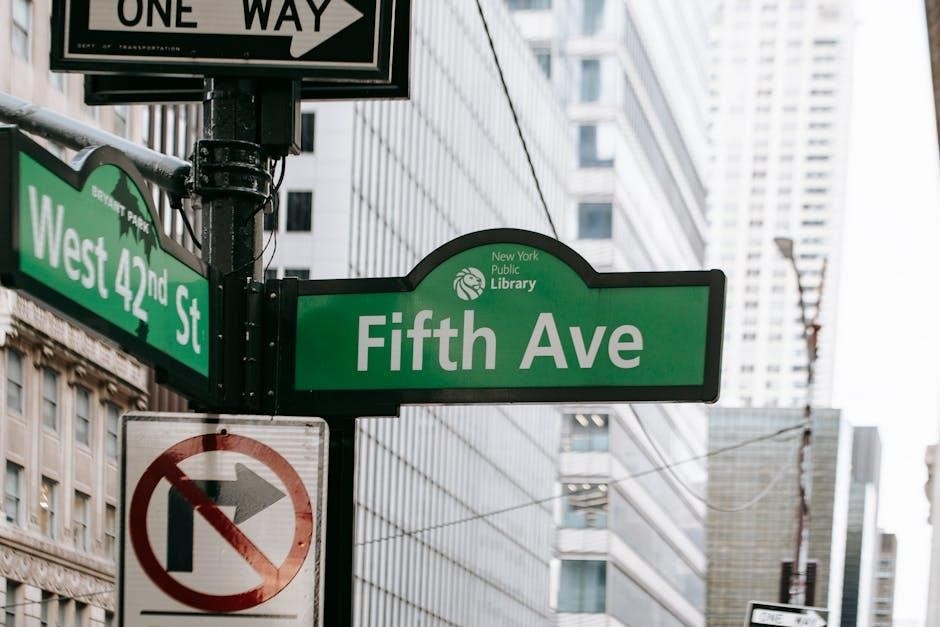Becoming a Notary Public in NYC requires passing a challenging exam. This guide provides free resources and strategies to help candidates prepare effectively, ensuring success and understanding of notary duties.
What is a Notary Public?
A Notary Public is a state-appointed official who serves as an impartial witness to document signings, verifying identities and ensuring the authenticity of signatures. Their role is to prevent fraud by confirming that signers act voluntarily and are aware of the document’s contents. Notaries also administer oaths and affirmations, certify copies of documents, and maintain records of their notarizations. While they do not provide legal advice, their oversight is crucial for upholding the integrity of legal processes. Becoming a Notary Public in NYC requires passing an exam and understanding these responsibilities to serve the public effectively and ethically.
Why Become a Notary in NYC?
Becoming a Notary Public in NYC offers numerous benefits. With the city’s fast-paced real estate and legal markets, Notaries are in high demand. It provides an opportunity to earn additional income through various services like document signings and certifications. The role offers flexibility, allowing individuals to work on their own terms. Additionally, serving as a Notary enables you to contribute to your community by ensuring the authenticity and integrity of important documents. This position is both rewarding and practical, making it a valuable skill in NYC’s dynamic environment.
Importance of the Exam
The Notary Public Exam is crucial for ensuring individuals understand their legal responsibilities and duties. It verifies knowledge of New York notary laws, ethical practices, and proper procedures. Passing the exam demonstrates competence in performing notarizations accurately and ethically. The exam also ensures public trust in the notary’s ability to prevent fraud and maintain document integrity. In NYC, where real estate and legal transactions are frequent, a qualified notary is essential. Failing to meet the exam’s standards can lead to legal consequences, making it vital to prepare thoroughly and understand the material covered in the test.

Eligibility Requirements
To become a Notary Public in NYC, applicants must meet specific criteria, including age, residency, and background checks. Training is not mandatory, but thorough preparation is essential for success.
Age and Residency Requirements
To qualify as a Notary Public in NYC, applicants must be at least 18 years old and either a New York State resident or employed within the city. Non-residents can apply if their business is located in NYC. Meeting these criteria is essential for eligibility. Proper documentation, such as proof of residency or employment, must be provided during the application process. These requirements ensure that Notaries are accountable and accessible within the state. Understanding and fulfilling these conditions is the first step toward becoming a certified Notary Public in New York City.
Background Check and Moral Character
A thorough background check is required to ensure applicants demonstrate good moral character. A criminal history or unethical behavior may disqualify candidates. The exam and application process emphasize trustworthiness, as Notaries handle sensitive documents. Applicants must disclose any legal issues and provide truthful information. Failure to pass the background check can result in denied certification. Maintaining high ethical standards is crucial for upholding the integrity of notarial duties. This step ensures only reliable individuals become Notaries, protecting the public and maintaining confidence in the notarization process across New York City.
Other Eligibility Criteria
Beyond age and residency, applicants must meet additional requirements. While no mandatory training is required in New York, passing the exam with at least 70% is essential. A fee is required for the exam, and applicants must demonstrate a strong understanding of notary laws and ethics. Study materials, such as free online guides and practice tests, are recommended to prepare effectively. Applicants must also agree to uphold the duties and responsibilities of a Notary Public, ensuring they are capable of performing the role ethically and efficiently. Proper preparation is key to meeting these criteria and succeeding in the exam.

Exam Registration Process
Registering for the NYC Notary Public exam involves submitting an application and paying the required fee. No mandatory training is needed, but self-study is essential for success.
How to Register for the Exam
To register for the NYC Notary Public exam, visit the official New York State website and complete the application form. Submit required documents and pay the exam fee. No mandatory training is needed, but self-study is crucial. Utilize free online resources, such as study guides and practice tests, to prepare effectively. Ensure all information is accurate to avoid delays. Once registered, receive confirmation and proceed to the exam. Proper preparation is key to achieving the required 70% passing score. Use available free materials to enhance your knowledge and confidence before the test.
Exam Fees and Payment Methods
The NYC Notary Public exam fee is a mandatory cost for registration. Payment can be made via credit card, check, or money order. Ensure accurate payment to avoid processing delays. The fee covers exam administration and is non-refundable. Proper payment is essential for completing registration. While no training is required, investing time in self-study is crucial for success. Utilize free study guides and practice tests to prepare effectively. Payment confirmation is necessary to schedule the exam. Make sure to review payment instructions carefully to avoid any issues. This step is vital for advancing in the Notary Public certification process in NYC.
Preparing for the Exam
Preparing for the NYC Notary Public exam requires a focused approach. Utilize free online study guides and practice tests to familiarize yourself with the exam format. Review New York notary laws, duties, and ethical considerations thoroughly. Understand procedures for certifications, recordkeeping, and electronic notarization. Practice time management to ensure you can answer all questions within the allotted time. Focus on areas where errors are common, such as notarizing signatures and handling public records. Use recommended books and manuals for in-depth understanding. Regularly test your knowledge with practice exams to identify and improve weak areas. Consistent study and practice are key to success.

Key Topics on the Exam
The exam covers New York Notary Laws, duties, ethical considerations, and procedures. Understanding certification processes, recordkeeping, and electronic notarization is crucial. Familiarize yourself with public record handling and official misconduct definitions.
New York Notary Laws
Understanding New York Notary Laws is essential for exam success. Key topics include electronic notarization, recordkeeping requirements, and certification processes. Notaries must adhere to strict guidelines for handling public records and avoiding official misconduct. Familiarize yourself with laws governing notarial acts, such as witness requirements and document authentication. Additionally, learn about prohibited practices and the consequences of non-compliance. These laws ensure the integrity of notarized documents and protect the public. Mastery of these legal standards is critical for performing duties ethically and legally as a Notary Public in New York.
Duties and Responsibilities
As a Notary Public in NYC, your primary duties include verifying identities, witnessing document signings, and ensuring the authenticity of notarized acts. You must maintain accurate records, handle sensitive information confidentially, and avoid conflicts of interest. Notaries are also responsible for refusing service when a signer appears coerced or lacks mental capacity. Proper execution of these responsibilities upholds legal standards and public trust. Understanding your role is vital for ethical practice and passing the exam. Free study guides can help clarify these duties, ensuring you are well-prepared to fulfill your obligations effectively.
Ethical Considerations
Ethical behavior is crucial for Notaries Public in NYC. Maintaining impartiality, avoiding conflicts of interest, and ensuring confidentiality are key principles. Notaries must refuse service if a signer appears coerced or lacks mental capacity. Engaging in dishonest or unlawful acts can lead to legal consequences, including misdemeanors. Upholding ethical standards protects the integrity of notarized documents and public trust. Free study guides emphasize these principles, helping candidates understand their moral obligations and the importance of adhering to New York notary laws. Ethical practices are not only legally required but also essential for building a reputable professional career as a Notary Public.
Procedures and Best Practices
Mastering proper notarization procedures is essential for NYC Notaries. Key steps include verifying signers’ identities, ensuring documents are complete, and adhering to New York notary laws. Best practices involve maintaining detailed records, storing supplies securely, and avoiding conflicts of interest. Notaries should also stay updated on electronic notarization procedures and follow ethical guidelines. Free study guides provide comprehensive insights into these processes, helping candidates understand the practical aspects of the role. By following established protocols, Notaries ensure legal compliance and uphold the integrity of their services, avoiding potential legal or disciplinary actions. Proper procedures are vital for effective and responsible notarization practices in NYC.

Study Materials and Resources
Utilize free online study guides, recommended books, and online courses to prepare for the NYC Notary Public Exam. These resources cover essential topics and practical tips effectively.
Free Online Study Guides
Free online study guides are readily available for the NYC Notary Public Exam, offering comprehensive overviews of notary laws, duties, and ethical considerations. These guides often include practice questions, flashcards, and summaries of key topics like recordkeeping and electronic notarization. They are designed to help candidates understand the exam format and content without additional costs. Many guides are updated annually to reflect changes in state laws and procedures. Utilizing these resources can significantly improve preparation and confidence. Additionally, some guides provide tips for time management and strategies for tackling different question types effectively during the exam.
Recommended Books and Manuals
Several books and manuals are highly recommended for preparing for the NYC Notary Public Exam. Titles like “NYS Notary Exam with 100 Correct Answers 2023” and “New York Notary Public Exam Study Guide” provide detailed insights into notary laws, duties, and ethical considerations. These manuals often include practice questions, legal terminology, and step-by-step guides for complex notary procedures. They are designed to complement free study guides, offering in-depth analysis of topics like recordkeeping, electronic notarization, and official misconduct. While not required, these resources are invaluable for understanding the exam format and ensuring thorough preparation for the challenging test.
Online Courses and Tutorials
Free and paid online courses are available to help prepare for the NYC Notary Public Exam. Platforms like Skillshop and Google Analytics Academy offer e-learning resources. These courses cover essential topics such as notary laws, ethical considerations, and procedural best practices. Many include interactive quizzes and practice exams to reinforce learning. Some courses, like those on Analytics Academy, provide detailed breakdowns of exam topics and test-taking strategies. These resources are ideal for self-paced learning, allowing candidates to master the material at their convenience. They often include expert instructors and up-to-date information to ensure comprehensive preparation for the exam.

Test-Taking Strategies
Master time management, approach question types strategically, and use effective guessing techniques to maximize scores. These methods ensure confidence and accuracy during the Notary Public Exam.
Time Management During the Exam
Effective time management is crucial for success. Allocate 1-2 minutes per question to ensure thorough reading and thoughtful answers. Skim through the exam first to identify easier questions, tackling them quickly to save time for more challenging ones. Practice with timed simulations to build speed and accuracy. Prioritize questions you’re confident about, marking others for review later. Avoid spending too long on a single question, as it can jeopardize your ability to complete the exam. Use practice exams to refine your pacing and ensure you finish within the allotted time, minimizing stress and maximizing your score.
Approach to Different Question Types
Mastering different question types is essential for exam success. Multiple-choice questions require careful reading and elimination of incorrect answers. True/false questions demand precise understanding, as small details can change the answer. Scenario-based questions test practical application of notary laws, so focus on identifying key elements like jurisdiction and required documentation. Definition questions assess knowledge of legal terminology, ensuring clarity and accuracy. Skim the exam to tackle familiar questions first, then return to challenging ones. Use practice exams to refine your approach, building confidence and accuracy in addressing each question type effectively.
Effective Guessing Techniques
When faced with unclear questions, use effective guessing strategies. Eliminate obviously incorrect answers first, increasing your chances of selecting the right one. Look for patterns in answer choices, as similar themes may indicate the correct response. If time permits, revisit skipped questions to make educated guesses. Practice exams help familiarize you with question formats, reducing uncertainty. Stay calm and avoid changing answers unless you’re certain. Guessing strategically can improve your score, especially when combined with thorough preparation and understanding of key concepts. Use this approach wisely to maximize your potential on the Notary Public Exam.
Practice Exams and Simulations
Practice exams and simulations are crucial for exam readiness. Utilize free online resources and study guides to familiarize yourself with the exam format and improve your performance effectively.
Importance of Practice Exams
Practice exams are essential for mastering the Notary Public Exam. They help candidates familiarize themselves with the exam format, identify weak areas, and improve time management. By simulating real test conditions, practice exams reduce anxiety and build confidence. Free online resources, such as sample questions and study guides, provide valuable preparation tools. Regularly taking practice exams ensures a thorough understanding of New York Notary laws and procedures, increasing the likelihood of passing the exam with a score of 70% or higher. Consistent practice is key to achieving success in this critical step toward becoming a Notary Public in NYC.
Where to Find Free Practice Questions
Free practice questions for the NYC Notary Public Exam can be found through various online resources. Websites like howtobecomeanotaryinny.com offer sample exams and study guides. Additionally, platforms like Docsity provide free study materials, including practice tests and guides. Some resources, such as the NYS Notary Exam Practice Test PDF, include updated questions and answers. Utilizing these tools helps candidates prepare effectively without additional costs. Free email providers can also be used to access these materials, ensuring everyone has the opportunity to practice and succeed on the exam.
Simulating Exam Conditions
Simulating exam conditions is crucial for effective preparation. Create a quiet, distraction-free environment and use a timer to mimic the actual test duration. Practice with full-length mock exams, such as the NYS Notary Exam Practice Test PDF, to build stamina. Review answers to identify weaknesses and focus on improvement areas. Utilize free resources like the NY Notary Public Law Booklet for authentic questions. Replicating test conditions helps reduce anxiety and improves time management skills, ensuring a more confident performance on exam day. Regular simulation also enhances familiarity with the exam format and question types.

Common Mistakes to Avoid
Underestimating exam difficulty, neglecting key topics, and poor time management are common pitfalls. Procrastination and inadequate practice can lead to failure. Stay focused and thorough in preparation.
Frequent Errors in Exam Preparation
Many candidates underestimate the exam’s difficulty, leading to insufficient study. Others skip practicing with sample questions, hindering familiarity with the format. Poor time management during preparation and neglecting key topics like notary laws and ethical considerations are common. Some focus too much on minor details while ignoring critical areas. Additionally, failing to review mistakes from practice exams can prevent improvement. To succeed, candidates must allocate time wisely, prioritize high-weight topics, and regularly test their knowledge using free study guides and practice exams available online. Avoiding these errors ensures a more confident and prepared approach to the Notary Public Exam.

